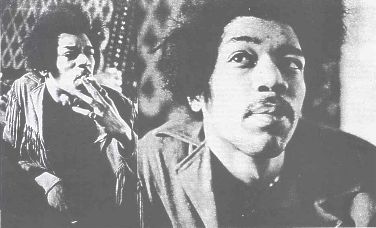Would you like to make this site your homepage? It's fast and easy...
Yes, Please make this my home page!
 |
John Hammond Jr. Interview 1986 |
 |
| |
 |
|
|
|
|
|
|
|
|
|
|
|
|
|
| |
|
|
|
|
|
|
|
|
|
|
|
|
|
|
|
|
He'd just come back from England, and he was a big star- in six months he'd become the biggest thing in Europe. And he sat in with us for about a week because his tour had fallen through, that Monkees tour. Actually he was supposed to have his own tour, but they wouldn't play "Hey Joe" on the radio here because of the lyrics, I guess. So he had some time to kill. He came in with a wad of money, I remember. Charles Otis had loaned him some money before he left, so Jimi paid him back. Charles told me Jimi pulled out a roll with hundred and thousand dollar bills and said,"Here, man, take what you need." And Charles took the he had loaned Jimi and said, No, that's cool, man but it sure impressed Charles forever.
At one point Eric Clapton was in New York as well, and both of them jammed with us for two nights in a row at the Gaslight. It was amazing. There was a crowd of about eighty people in there [laugh]. The Gaslight was a small place, and there were no advertisements or anything like that. It was just that anybody who happened to be there at the time had an earful. What were the two of them playing?, Blues, man, straight, heavy blues. Offstage Jimi was self -contained- he knew who he was, but he was kind of quiet. He was an intelligent guy, and he had the kind of sophistication of somebody who'd been around but wasn't stuck in something. He knew what he liked and he knew that he was going to make it- I mean, he knew it. I knew it; anyone around him knew it. The intensity and the fact that he was so intent, his demeanor- he was not a young kid who didn't know anything, he had been around, and he came from a scene that was very sophisticated.
I saw Jimi again in '68: he was playing uptown at a college, and I was the opening show with my band. His manager came backstage and said, "We're going to have to cut your time from an hour to thirty minutes"- it really bummed me out. After the show I got an apology from Jimi, but I was really pissed off. I had a call from him not too long after that. He had become so big-time at this point that he was earning like ,000 a night or there abouts, and he was surrounded by all these political-type guys and big-business scene. Y'know, I got this feeling that he was being manipulated through it all, as much as he was becoming a big star, because of his phenomenal success. I noticed that he was staying pretty high, and I remember Charles Otis and I after we saw him said to each other, "Gee, I hope he can hold on to it, because it looks like it's heavy-duty for him." The Black Panthers were hanging around him, too, saying, "Your money could be going to us. "Everybody wanted a piece of him, and he was so high at this point that we were worried for him, because we admired him a lot as a musician and as a person. When I was talking with him, he said, "Wow, man, are you into acid?" And I said, "No, I'm not." He said, "Oh, man you don't know what you're missing; this Purple Haze stuff is really far out and it's great every day." And I said, "Oh, God, Jimi, every day?" But he was a nice person, he was not full of shit, he was somebody. And that's how I remember him.
I think the most unique thing about Jimi's playing was the fact that he could, when he was onstage, improvise absolutely from the spirit- it came right through him, he just magically knew how to do it, when he was on. I don't think he would ever have been able to tell anyone how he did it, y'know, it was just something that came through him, inspired him. In that way he was unique. In terms of knowing his ax, he felt completely at home with that Stratocaster- I mean, I knew him before he had that wall of Marshall amps. When I heard his first album the thing that most impressed me about it was the fact that he was just himself on it, even if it wasn't really enough blues for me. That's what young guitarists ought to pick upon- the magic, the inspiration. Not necessarily playing the same notes or anything, but having that feeling, because Jimi sure had it. That's why I knew he was going to be a star - he had something that was just too big to contain.
London, England 1969


